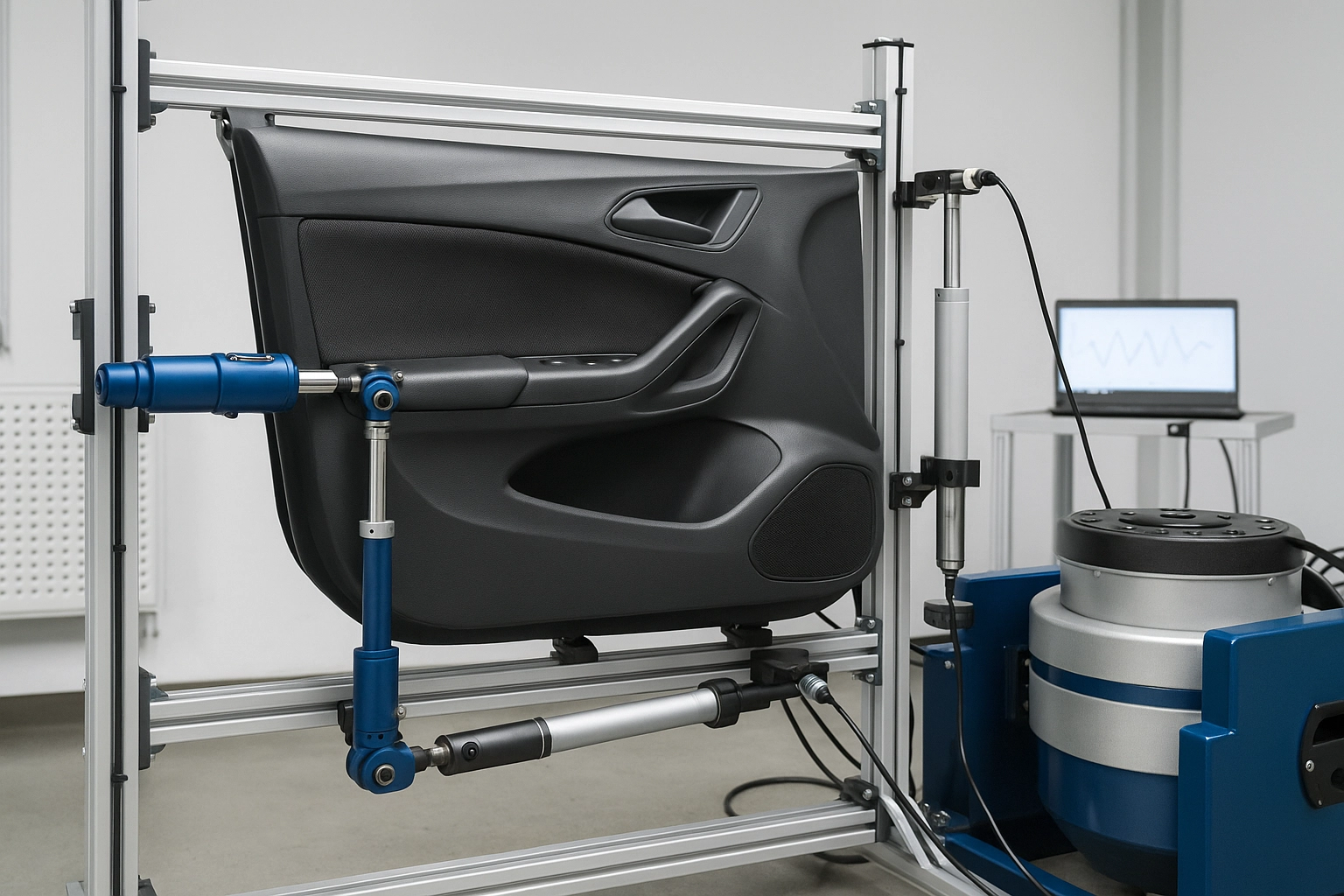JIS D0203 Automotive Relay BSR Durability Testing
The JIS D0203 standard for automotive relay buzz, squeak & rattle (BSR) durability testing is a critical process in the quality assurance of electronic components used in automobiles. This test ensures that relays operate reliably under various environmental and mechanical stresses without generating unwanted noise or vibrations.
The JIS D0203 standard was developed to address the growing concern over the noise generated by automotive electronics, which can significantly impact customer satisfaction. Automotive relays are essential components in modern vehicles, controlling electrical circuits for safety systems, headlights, and other critical functions. Ensuring that these relays meet strict BSR standards is vital for maintaining vehicle performance and comfort.
The testing process involves subjecting the relay to a series of environmental stressors such as temperature cycling, humidity exposure, and vibration. The goal is to simulate real-world conditions the relay will encounter during its operational life in a vehicle. By conducting this test, manufacturers can identify potential issues early in the development phase, preventing costly recalls and enhancing overall product reliability.
The JIS D0203 BSR testing protocol includes several key components:
- Temperature cycling between -40°C to 85°C
- Humidity exposure at 93% relative humidity for 168 hours
- Vibration testing using a random vibration test with an amplitude of ±2.5 g, frequency range from 10 Hz to 2 kHz
During the test, the relay is subjected to these environmental conditions in cycles that simulate the operational environment it will encounter during its lifetime. The duration and severity of each stressor are carefully controlled to ensure that the relay undergoes realistic conditions without overexposure.
The testing apparatus used for JIS D0203 BSR testing includes specialized environmental chambers capable of maintaining precise temperature and humidity levels, as well as vibration tables designed to generate the specified random vibrations. The test setup ensures reproducibility and consistency in the results, which are crucial for accurate quality assurance.
The acceptance criteria for JIS D0203 BSR testing include ensuring that the relay operates without generating any audible noise or excessive vibrations above acceptable levels. Compliance with these standards helps manufacturers ensure that their relays meet customer expectations and regulatory requirements.
Failure to comply with the JIS D0203 standard can lead to significant issues, including customer dissatisfaction due to operational noise, potential safety concerns if the relay fails during critical operations, and costly recalls. Therefore, conducting this test is essential for maintaining high-quality standards in automotive manufacturing.
Scope and Methodology
The scope of JIS D0203 BSR testing encompasses the evaluation of automotive relays to ensure they meet stringent durability requirements. The methodology involves a series of environmental stress tests designed to simulate real-world conditions that the relay will encounter during its operational life in a vehicle.
The test begins with temperature cycling, where the relay is subjected to rapid changes between -40°C and 85°C. This process helps identify any thermal expansion or contraction issues that could lead to operational failures. Following temperature cycling, the relay undergoes humidity exposure at 93% relative humidity for 168 hours. This step tests the relay's ability to withstand moisture, which is a common cause of corrosion and failure in electronic components.
The final stage of the test involves vibration testing using a random vibration table with an amplitude of ±2.5 g and a frequency range from 10 Hz to 2 kHz. This step evaluates the relay's resilience against mechanical stress, ensuring that it can operate reliably under dynamic conditions without generating excessive noise or vibrations.
The test protocol is designed to be comprehensive and reproducible, allowing for consistent results across multiple tests. The apparatus used in this testing includes environmental chambers capable of maintaining precise temperature and humidity levels, as well as vibration tables tailored to generate the specified random vibrations.
Throughout the testing process, detailed records are kept to ensure that each step is accurately documented. These records serve as a critical reference for quality assurance teams and can be used to identify any areas requiring improvement in future iterations of the product.
Benefits
The primary benefit of JIS D0203 BSR durability testing is the enhancement of overall product reliability. By ensuring that relays meet stringent standards, manufacturers can prevent costly recalls and improve customer satisfaction. This test helps identify potential issues early in the development phase, allowing for corrective measures to be implemented before production begins.
Compliance with JIS D0203 also ensures that products meet regulatory requirements, which is essential for maintaining a competitive edge in the market. Automotive manufacturers who comply with these standards are more likely to gain customer trust and loyalty, leading to increased sales and market share.
In addition to reliability, JIS D0203 testing helps improve product performance by identifying any design flaws or manufacturing defects that could lead to operational noise or vibrations. This early detection allows for improvements in the design process, resulting in quieter and more efficient products.
The test also supports environmental sustainability efforts by ensuring that components are designed with durability in mind. By reducing the need for recalls and replacements, manufacturers can minimize waste and reduce their carbon footprint.
Quality and Reliability Assurance
- Precision Environmental Control: The environmental chambers used in JIS D0203 testing are equipped with precision temperature and humidity control systems to ensure accurate and consistent test conditions.
- Vibration Isolation: Vibration tables are designed to provide precise and reproducible random vibration tests, ensuring that the relay undergoes realistic stressors without overexposure.
- Data Logging: Comprehensive data logging systems capture detailed records of each test cycle, providing a clear audit trail for quality assurance teams.
- Repeatable Testing: The testing apparatus is designed to be repeatable, ensuring consistent results across multiple tests. This consistency is crucial for accurate quality assessment and improvement.





